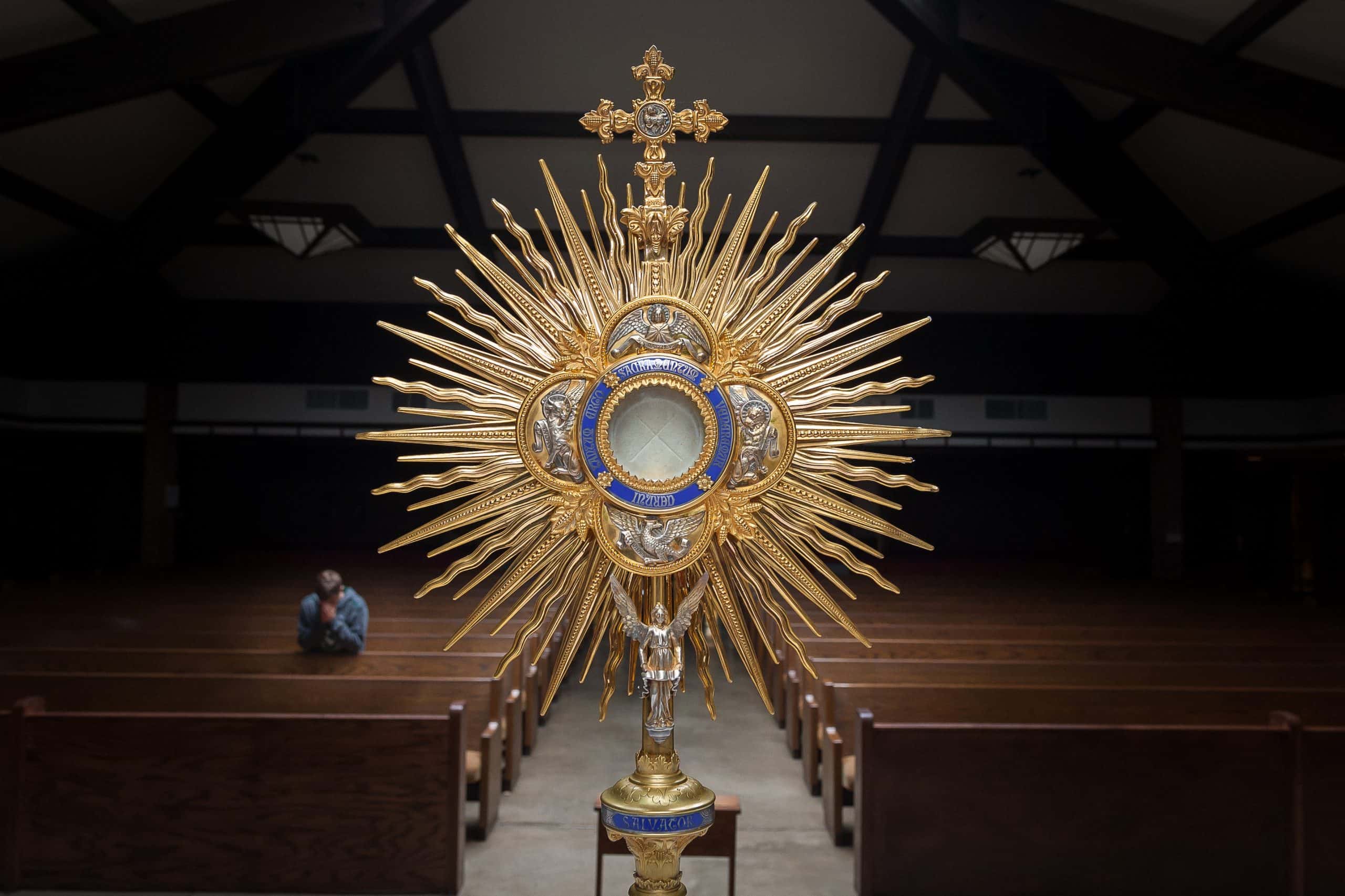Baptism
Baptism is the first and necessary sacrament to become a Christian. Baptism can be undertaken at any age. Baptism frees us from sin and makes us members of the Christian community. We become sons and daughters of God.
Baptism is modeled upon the baptism of Christ Himself. Water is used to symbolize death to sin, life in Christ and the cleansing of the soul from all sin, including original sin. The words used are, “I baptize you in the name of the Father and of the Son and of the Holy Spirit. Amen.” Typically, a priest or deacon is the one who baptizes.
To schedule a baptism, please call Fr. Andrew Ricci at 715.392.8511 and leave a message.
Eucharist
The Eucharist is the source and summit of the Catholic faith. We believe that Jesus, at the Last Supper, gave us a New Covenant and this covenant is founded on the Eucharist. At that Last Supper, Christ clearly gave His Body and Blood, promising that whoever partakes of it will have eternal life.
As a faith community, we bring forward bread and wine, gifts from God that we now return back to Him. The priest (acting in persona Christi, or in the person of Christ) takes these gifts and prays over them the words that Jesus prayed at the Last Supper. We believe that these gifts – what appears to still be bread and wine – have changed in substance, and are now the Body and Blood of Christ.
Typically, children receive their First Communion when they are Seven-years-old, so around Second grade.
Confirmation
Confirmation is one of the three sacraments of initiation. In our diocese, we typically confirm when the student is in Eleventh grade or above. The sacrament of confirmation is typically conferred at the Cathedral, with the bishop of the diocese.
When we are baptized, we receive – partially – the gifts of the Holy Spirit. Confirmation completes those gifts in us. With Confirmation, we are “sealed” in the Spirit.
When one is confirmed, the bishop will lay hands on the person, and then anoint them with chrism (blessed oil) reserved for just this purpose. The use of oil has a rich history in the Church: it symbolizes (in part) cleansing, healing, and strengthening. In Confirmation, we are strengthened in Christ and in our ability to live an outward Christian life.
Marriage
A marriage between two Christians has
- a natural element, and
- a spiritual element.
Marriage is a practice common in all cultures, a natural institution. At its most basic level, marriage is a union between a man and a woman for the purpose of procreation, mutual support, or love.
In the Catholic Church, however, marriage is more than this. Marriage was elevated by Christ Himself
[by His participation in the wedding at Cana (John 2:1-11)] to be one of the seven sacraments. Thus, Marriage is not something that happens once and is forgotten. The vows of Marriage are to be lived out each and every day.
Sacramental marriage is a symbol of the divine union between Christ the Bridegroom, and His Church the Bride. As married Christians, open to the creation of new life and committed to our mutual salvation, we participate not only in God’s creative act but in the redemptive act of Christ.
To inquire about possible wedding dates and wedding preparation, please call Fr. Andrew Ricci at 715.392.8511 and leave a message.
Anointing of the Sick
Illness and suffering are a fact of life, and the Church walks alongside those who are sick, undergoing treatment for illness or are dying. We know that in Christ Jesus, we have a God who understands human suffering, as He Himself suffered.
In earlier times, the Church reserved anointing for those at the point of death. However, a deeper understanding of human frailty and the healing brought about by this sacrament means that the Anointing of the Sick is now offered to anyone undergoing a serious illness, those facing surgery, the elderly and those who are dying. Often, this sacrament is celebrated in a person’s home or in the hospital. It is also fitting to celebrate within the Mass and to offer the sacrament communally.
The priest lays his hands on the person receiving this sacrament, then anoints them with blessed oil. The Church asks that God give strength to the person who is sick and that they be more closely united with Christ in their suffering. Healing, if it is God’s will, is requested as well.
The Church does offer particular solace to those who are dying. Viaticum (meaning “food for the journey”) is Eucharist offered to those who are close to death.
To request annointing, please call the Cathedral Parish Office at 715.392.8511 or St. Anthony in Superior at 715.398.3261

